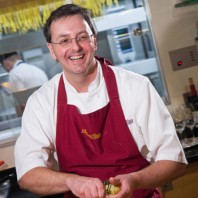Raymond Blanc himself greets us at the 9am debriefing where his enthusiastic vocal fireworks set the tone for the day. As we get suited in chef’s whites, he delivers a verbal guarantee that we will take away new ideas from the day.
Classes are run by one of Blanc’s most loyal lieutenants, Mark Peregrine, who first worked with the French chef more than 30 years ago at the original Les Quat’Saisons restaurant in Oxford. Peregrine has paid his dues to the cut and thrust of the restaurant ‘furnace’ and is happier now with the more gentle rhythms of the cookery school kitchen. He knows his stuff and rattles through the day. If, at times, he sounds a bit ‘scripted’ that’s because he takes daily classes and knows the routine like the back of his surprisingly unscarred hands.
The kitchen, I expect, deliberately mimics those of many of the Home Counties’ women, aged between 40 and 65, who are on the course. It is a homely, country-style kitchen with a central island surrounded by well stocked stations where we work in pairs. The ovens are Gaggenau, there are three TV screens angled down above the demo island so we can see clearly into pans and a corner ‘shrine’ of shelves that display Blanc’s back catalogue of cookery books. The master is watching us!
We cover all sorts. Flipping backwards and forwards through a 20-page Summer Dinner Party pamphlet which contains the eight recipes that we tackle in a day. We learn to distil tomato essence to infuse a summer vegetable risotto, to bake a strawberry fraiser sponge filled with mousseline, to make two varieties of pistou soup and stuff roasted red peppers with fruit filled couscous. If some of these dishes seem simple for the competent domestic chef, they were livened up with clever touches and techniques. There was a lot of information packed in to the day as Peregrine exploded myth after myth and dispensed no end of handy tips in his laconic tone (see below for tips).
In the background to all the busying around we slow-roasted a shoulder of lamb rested on a tray of bones. A sommelier pops in to give us a brief description of the wine we’ll be drinking with lunch. Blanc drops in – as he’s prone to do if he’s in the building – walks once round the kitchen, causes an excited buzz and then disappears.
Lunch is taken at the main kitchen island and once we start eating we don’t really stop for the rest of the day. I thought it would have been a treat to take lunch in the splendid gardens seeing as the sun was shining but it’s part of the course’s tight structure to stay in the kitchen and carry on learning as we ate, which was no bad thing.
It’s an art to be able to demonstrate how to make a dish in a logical sequence in order that students can go away and try the dish on their own and this worked well with the exception of the final poaching of the peaches which was a bit confusing – perhaps due to Peregrine’s perfectionism.
We didn’t see Blanc again but the school delivered on his promise. The majority of our group of ten students felt relieved that the course hadn’t been too intimidating – that we hadn’t been forced to turn out the sort of food served from the adjoining kitchen for the two Michelin-starred restaurant. We left burdened down with a framed certificate, RB frying pan and our cakes and a headful of ideas.
Mark’s Top Tips:
Red wine, once opened, keeps better in the fridge.
Don’t wash strawberries, they absorb more water – wipe them with a damp cloth.
Try chervil as an alternative to parsley – you might be pleasantly surprised.
The freshest fish in the supermarket is often the frozen stuff which would have been frozen straight away on the boat.
There’s a greater yield of meat from a shoulder of lamb than from rack or chops and it’s cheaper.
An olive oil will start to oxidise and lose its flavour after eight to 12 weeks.
Pastry baked from frozen to a pre-heated oven gets the best results (and Peregrine should know, he ran his own patisserie in London).
There are more than a dozen different types of courses at the Raymond Blanc Cookery School, prices start from £350 per person and include one-day tuition (9am – 4.30pm), morning and afternoon tea, lunch in the cookery school and a course certificate.

